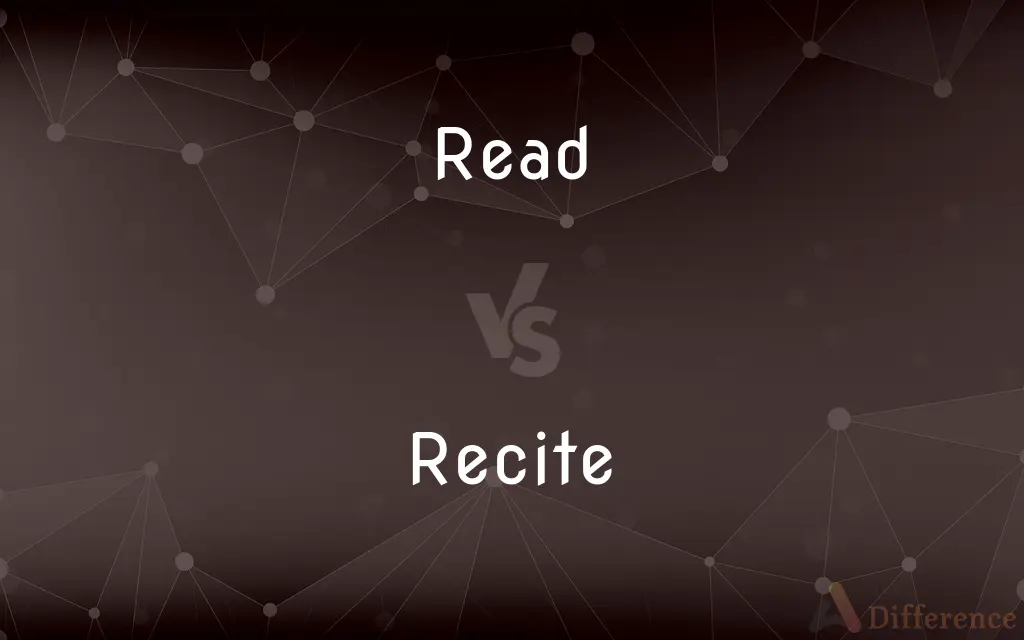Read vs. Recite — What's the Difference?
By Tayyaba Rehman & Urooj Arif — Updated on April 1, 2024
Reading involves interpreting and understanding written text, while reciting is verbally repeating memorized information.

Difference Between Read and Recite
Table of Contents
ADVERTISEMENT
Key Differences
Reading is a cognitive process that entails recognizing and comprehending words and sentences on a page or screen. It requires the ability to decode symbols (like letters and punctuation) to understand the meaning behind them. This process not only involves the mechanical aspect of recognizing words but also the higher-level function of grasping context, making inferences, and synthesizing information. For example, reading a novel involves immersing oneself in the narrative, understanding the characters, plot, and themes. Reciting, on the other hand, involves speaking aloud words or passages from memory. It's a verbal activity that demonstrates one's ability to remember and reproduce specific information without looking at the original source. Recitation can be used for various purposes, such as performing poetry, delivering speeches, or practicing religious rituals. Unlike reading, reciting focuses on memory and verbal expression, often involving elements of performance like intonation and pacing.
While reading can be a private, internalized process, reciting is inherently public and auditory. Reading allows for personal interpretation and internal dialogue with the text, enabling readers to engage with the material on a deeper level. Readers can pause, reflect, and reread passages to enhance understanding. Recitation, by contrast, emphasizes the accurate reproduction of text from memory. It requires a different set of skills, including memorization, public speaking, and often, an understanding of rhythm and cadence. Reciting a poem, for instance, not only involves remembering the words but also conveying the poem's emotion and rhythm through vocal delivery.
The goals of reading and reciting also differ. Reading aims to extract information, enjoy literature, or gain knowledge from written materials. It is often a means to an end, such as learning a new skill or experiencing a story. Reciting, however, often aims to demonstrate knowledge, practice linguistic or rhetorical skills, or engage an audience through oral presentation.
Both reading and reciting play crucial roles in education and communication. Reading is fundamental to learning and personal development, serving as a foundation for acquiring new information. Recitation reinforces memory, enhances public speaking skills, and can deepen one's connection to the material through the act of sharing it with others.
Comparison Chart
Definition
Interpreting and understanding written text.
Verbally repeating memorized information.
ADVERTISEMENT
Process
Cognitive, involving decoding and comprehension.
Verbal, focusing on memory and expression.
Skills Involved
Decoding, comprehension, analysis.
Memorization, public speaking, expression.
Purpose
To extract information, enjoy, or learn.
To demonstrate knowledge or engage an audience.
Engagement
Private, allows for personal interpretation.
Public, emphasizes performance and audience interaction.
Compare with Definitions
Read
To interpret written or printed material.
She reads a new book every week to satisfy her love for stories.
Recite
Delivering a speech without referring to notes.
The valedictorian recited her graduation speech perfectly.
Read
Analyzing literature for deeper meanings.
Students read Shakespeare's plays to explore complex themes.
Recite
To verbally repeat information from memory.
He can recite all the U.S. Presidents in order.
Read
Reading for pleasure or personal interest.
Reading fantasy novels is her favorite way to relax.
Recite
Performing a piece of poetry or text aloud.
She recited her favorite poem in front of the class.
Read
Engaging with text to gain information.
He reads the newspaper daily to keep up with current events.
Recite
Chanting or speaking religious texts.
Priests recite prayers during religious ceremonies.
Read
Decoding symbols to understand messages.
Children learn to read by associating letters with sounds.
Recite
Recalling facts or information verbally.
Children often recite the alphabet as part of their learning process.
Read
To examine and grasp the meaning of (written or printed characters, words, or sentences).
Recite
To repeat or utter aloud (something memorized or rehearsed), often before an audience
Recite a prayer.
Recite a poem.
Read
To utter or render aloud (written or printed material)
Read poems to the students.
Recite
To relate in detail
Recited to me his tale of woe.
Read
To have the ability to examine and grasp the meaning of (written or printed material in a given language or notation)
Reads Chinese.
Reads music.
Recite
To list or enumerate
The affidavit recites facts about the incident.
Read
To examine and grasp the meaning of (language in a form other than written or printed characters, words, or sentences)
Reading Braille.
Reading sign language.
Recite
To deliver a recitation.
Read
To examine and grasp the meaning of (a graphic representation)
Reading a map.
Recite
To repeat lessons prepared or memorized.
Read
To discern and interpret the nature or significance of through close examination or sensitive observation
The tracker read the trail for signs of game.
Recite
(transitive) To repeat aloud (some passage, poem or other text previously memorized, or in front of one's eyes), often before an audience.
Janice is able to recite pi to 100 decimals.
Read
To discern or anticipate through examination or observation; descry
"I can read abandonment in a broken door or shattered window" (William H. Gass).
Recite
(transitive) To list or enumerate something.
Read
To determine the intent or mood of
Can read your mind like a book.
A hard person to read.
Recite
(intransitive) To deliver a recitation.
Read
To attribute a certain interpretation or meaning to
Read her words differently than I did.
Recite
To repeat, as something already prepared, written down, committed to memory, or the like; to deliver from a written or printed document, or from recollection; to rehearse; as, to recite the words of an author, or of a deed or covenant.
Read
To consider (something written or printed) as having a particular meaning or significance
Read the novel as a parable.
Recite
To tell over; to go over in particulars; to relate; to narrate; as, to recite past events; to recite the particulars of a voyage.
Read
To foretell or predict (the future).
Recite
To rehearse, as a lesson to an instructor.
Read
To receive or comprehend (a radio message, for example)
I read you loud and clear.
Recite
To state in or as a recital. See Recital, 5.
Read
To study or make a study of
Read history as an undergraduate.
Recite
To repeat, pronounce, or rehearse, as before an audience, something prepared or committed to memory; to rehearse a lesson learned.
Read
To learn or get knowledge of from something written or printed
Read that interest rates would continue to rise.
Recite
A recital.
Read
To proofread.
Recite
Recite in elocution
Read
To have or use as a preferred reading in a particular passage
For change read charge.
Recite
Repeat aloud from memory;
She recited a poem
The pupil recited his lesson for the day
Read
To indicate, register, or show
The dial reads 32°.
Recite
Render verbally,
Recite a poem
Retell a story
Read
(Computers) To obtain (data) from a storage medium, such as an optical disc.
Recite
Narrate or give a detailed account of;
Tell what happened
The father told a story to his child
Read
(Genetics) To decode or translate (a sequence of messenger RNA) into an amino acid sequence in a polypeptide chain.
Recite
Specify individually;
She enumerated the many obstacles she had encountered
The doctor recited the list of possible side effects of the drug
Read
To examine and grasp the meaning of printed or written characters, as of words or music.
Read
To speak aloud the words that one is reading
Read to the children every night.
Read
To learn by reading
Read about the storm in the paper today.
Read
To study.
Read
To have a particular wording
Recite the poem exactly as it reads.
Read
To contain a specific meaning
As the law reads, the defendant is guilty.
Read
To indicate, register, or show a measurement or figure
How does your new watch read?.
Read
To have a specified character or quality for the reader
Your poems read well.
Read
Something that is read
"The book is a page-turner as well as a very satisfying read" (Frank Conroy).
Read
An interpretation or assessment
Gave us her read of the political situation.
Read
Informed by reading; learned
Only sparsely read in fields outside my profession.
Read
To look at and interpret letters or other information that is written.
Have you read this book?
He doesn’t like to read.
Read
To speak aloud words or other information that is written. often construed with a to phrase or an indirect object
He read us a passage from his new book.
All right, class, who wants to read next?
Read
(transitive) To read work(s) written by (a named author).
At the moment I'm reading Milton.
Read
(transitive) To interpret, or infer a meaning, significance, thought, intention, etc., from.
She read my mind and promptly rose to get me a glass of water.
I can read his feelings in his face.
Read
To consist of certain text.
On the door hung a sign that reads "No admittance".
The passage reads differently in the earlier manuscripts.
Read
(ergative) Of text, etc., to be interpreted or read in a particular way.
Arabic reads right to left.
That sentence reads strangely.
Read
To substitute (a corrected piece of text in place of an erroneous one); used to introduce an emendation of a text.
Our school focuses primarily on the classical authors (read "dead white males").
Read
Used after a euphemism to introduce the intended, more blunt meaning of a term.
Read
To be able to hear what another person is saying over a radio connection.
Do you read me?
Read
To observe and comprehend (a displayed signal).
A repeater signal may be used where the track geometry makes the main signal difficult to read from a distance.
Read
To make a special study of, as by perusing textbooks.
I am reading theology at university.
Read
To fetch data from (a storage medium, etc.).
To read a hard disk
To read a port
To read the keyboard
Read
To recognise (someone) as being transgender.
Every time I go outside, I worry that someone will read me.
Read
To call attention to the flaws of (someone) in either a playful, a taunting, or an insulting way.
Read
(go) To imagine sequences of potential moves and responses without actually placing stones.
Read
(obsolete) To think, believe; to consider (that).
Read
(obsolete) To advise; to counsel. See rede.
Read
(obsolete) To tell; to declare; to recite.
Read
Inflection of [[:en:#Etymology_1
Read
A reading or an act of reading, especially of an actor's part of a play or a piece of stored data.
Read
(in combination) Something to be read; a written work.
His thrillers are always a gripping read.
Read
A person's interpretation or impression of something.
What's your read of the current political situation?
Read
An instance of calling attention to someone's flaws; a taunt or insult.
Read
(biochemistry) The identification of a specific sequence of genes in a genome or bases in a nucleic acid string
Read
Rennet. See 3d Reed.
Read
Saying; sentence; maxim; hence, word; advice; counsel. See Rede.
Read
Reading.
One newswoman here lets magazines for a penny a read.
Read
To advise; to counsel.
Therefore, I read thee, get thee to God's word, and thereby try all doctrine.
Read
To interpret; to explain; as, to read a riddle.
Read
To tell; to declare; to recite.
But read how art thou named, and of what kin.
Read
To go over, as characters or words, and utter aloud, or recite to one's self inaudibly; to take in the sense of, as of language, by interpreting the characters with which it is expressed; to peruse; as, to read a discourse; to read the letters of an alphabet; to read figures; to read the notes of music, or to read music; to read a book.
Redeth [read ye] the great poet of Itaille.
Well could he rede a lesson or a story.
Read
Hence, to know fully; to comprehend.
Who is't can read a woman?
Read
To discover or understand by characters, marks, features, etc.; to learn by observation.
An armed corse did lie,In whose dead face he read great magnanimity.
Those about herFrom her shall read the perfect ways of honor.
Read
To make a special study of, as by perusing textbooks; as, to read theology or law.
Read
To give advice or counsel.
Read
To tell; to declare.
Read
To perform the act of reading; to peruse, or to go over and utter aloud, the words of a book or other like document.
So they read in the book of the law of God distinctly, and gave the sense.
Read
To study by reading; as, he read for the bar.
Read
To learn by reading.
I have read of an Eastern king who put a judge to death for an iniquitous sentence.
Read
To appear in writing or print; to be expressed by, or consist of, certain words or characters; as, the passage reads thus in the early manuscripts.
Read
To produce a certain effect when read; as, that sentence reads queerly.
Read
Instructed or knowing by reading; versed in books; learned.
A poet . . . well read in Longinus.
Read
Something that is read;
The article was a very good read
Read
Interpret something that is written or printed;
Read the advertisement
Have you read Salman Rushdie?
Read
Have or contain a certain wording or form;
The passage reads as follows
What does the law say?
Read
Look at, interpret, and say out loud something that is written or printed;
The King will read the proclamation at noon
Read
Obtain data from magnetic tapes;
This dictionary can be read by the computer
Read
Interpret the significance of, as of palms, tea leaves, intestines, the sky, etc.; also of human behavior;
She read the sky and predicted rain
I can't read his strange behavior
The gypsy read his fate in the crystal ball
Read
Interpret something in a certain way; convey a particular meaning or impression;
I read this address as a satire
How should I take this message?
You can't take credit for this!
Read
Indicate a certain reading; of gauges and instruments;
The thermometer showed thirteen degrees below zero
The gauge read `empty'
Read
Be a student of a certain subject;
She is reading for the bar exam
Read
Audition for a stage role by reading parts of a role;
He is auditioning for `Julius Cesar' at Stratford this year
Read
To hear and understand;
I read you loud and clear!
Read
Make sense of a language;
She understands French
Can you read Greek?
Common Curiosities
What is reading?
Reading is the process of interpreting and understanding symbols, words, and sentences in written text.
How do reading and reciting differ?
Reading is a cognitive process focused on comprehension, while reciting is a verbal activity emphasizing memory and speech.
Can reading and reciting complement each other?
Yes, reading can enhance comprehension and knowledge, which aids memorization for recitation; recitation can reinforce memory and understanding of the text.
What is reciting?
Reciting is the act of verbally repeating memorized information or texts.
Why is reading important?
Reading is fundamental for learning, acquiring information, and personal enjoyment.
Why is reciting valuable?
Reciting reinforces memory, improves public speaking skills, and can make learning more engaging.
Do reading and reciting require different skills?
Yes, reading requires decoding and comprehension skills, while reciting requires memorization and verbal expression skills.
How can reading improve one's ability to recite?
Reading enhances vocabulary and understanding, which can make it easier to memorize and effectively recite texts.
Can reciting be considered a form of art?
Yes, especially in the context of performance, such as poetry recitation or dramatic readings, where expression and presentation are key.
Can reciting help with learning?
Yes, reciting can aid memory retention, comprehension, and the ability to convey information clearly.
How does reading affect the brain?
Reading stimulates cognitive processes, including memory, focus, and imagination, contributing to brain development.
How does one improve at reciting?
Practice, understanding the text, and developing effective memorization and public speaking techniques can improve recitation.
Is reciting always done from memory?
Typically, yes, reciting involves speaking from memory, though some forms may allow for brief references to the text.
What role does reading play in education?
Reading is a cornerstone of education, enabling the acquisition of knowledge across various subjects.
Are there digital tools to assist in reading and reciting?
Digital tools like e-readers, speech-to-text applications, and memorization apps can support both reading and reciting activities.
Share Your Discovery

Previous Comparison
Coal vs. Jet
Next Comparison
Logistics vs. DispatchAuthor Spotlight
Written by
Tayyaba RehmanTayyaba Rehman is a distinguished writer, currently serving as a primary contributor to askdifference.com. As a researcher in semantics and etymology, Tayyaba's passion for the complexity of languages and their distinctions has found a perfect home on the platform. Tayyaba delves into the intricacies of language, distinguishing between commonly confused words and phrases, thereby providing clarity for readers worldwide.
Co-written by
Urooj ArifUrooj is a skilled content writer at Ask Difference, known for her exceptional ability to simplify complex topics into engaging and informative content. With a passion for research and a flair for clear, concise writing, she consistently delivers articles that resonate with our diverse audience.














































